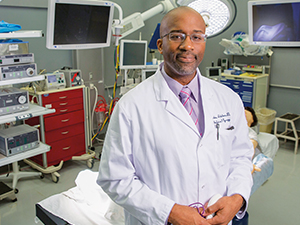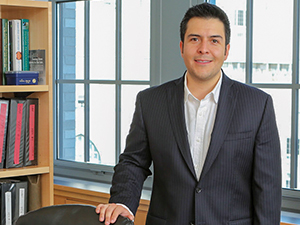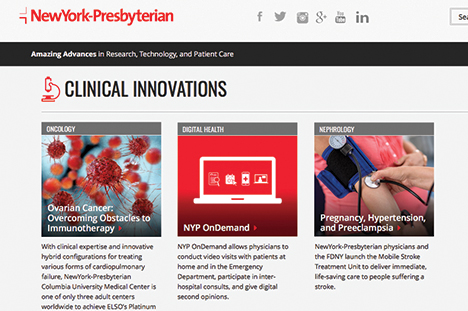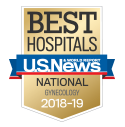|
||||||||||||||||||||||||||
|
Focus on Faculty:
After teaching computer science at a girls’ boarding school for three years following graduation from Columbia University, Uchenna Acholonu, Jr., MD, finally answered the call to enter medical school. From his youth, Dr. Acholonu, a minimally invasive gynecologic surgeon in the Department of Obstetrics and Gynecology at NewYork-Presbyterian/Weill Cornell Medical Center, felt drawn to the profession, partly influenced by his uncle, a gynecologist who continues to serve as a role model for Dr. Acholonu. “In high school I worked in registration in the Emergency Department of North Central Bronx Hospital just to get my foot in the door,” he says. “As an undergrad, I volunteered in the emergency room at NewYork-Presbyterian/Columbia University Irving Medical Center – again, just doing whatever I could to stay involved in clinical medicine.” Dr. Acholonu received his medical degree from SUNY Upstate Medical University and completed residency training in obstetrics and gynecology at St. Luke’s-Roosevelt Hospital. After three years as an OB/GYN generalist, Dr. Acholonu enrolled in a fellowship in minimally invasive and robotic surgery. Prior to joining Weill Cornell in 2016, he served as Director of Minimally Invasive and Robotic Gynecologic Surgery at Mount Sinai St. Luke’s-Roosevelt. Throughout his training, Dr. Acholonu never doubted that obstetrics and gynecology would be the ideal specialty for him. “Of all the clerkships in medical school, obstetrics and gynecology was the one that offered the opportunity to interact with patients in a variety of roles,” he says. “I enjoy routine visits as a way of providing preventive care and building long-term relationships with my patients. Having the ability to provide surgical intervention adds a welcome technical component to the field.” Although he no longer practices obstetrics, Dr. Acholonu still describes delivering babies as “the most amazing part of health care.” As a resident, Dr. Acholonu witnessed the benefits of minimally invasive surgery firsthand. “After seeing how patients fare after laparoscopic versus open procedures, it seems only right to offer the modality that would allow the patient to return to baseline sooner. Not to mention the benefits of decreased blood loss, shorter hospital stay, and improved cosmesis.” Dr. Acholonu gravitated towards the robotic platform. “The advent of robotic surgery appealed to the computer scientist that lay dormant within me,” he says. “This formed a natural juxtaposition of my interests that has continued to grow.” Today, Dr. Acholonu applies his expertise to a wide range of gynecologic issues from fibroids, abnormal uterine bleeding, endometriosis, and ovarian cysts to routine wellness, contraception, and the prevention and treatment of STDs. ducation is a key component of Dr. Acholonu’s work as he mentors residents and medical students. “You can train a physician to perform minimally invasive surgery, but it’s not just about the procedure, it’s about understanding when it is appropriate to use that modality,” says Dr. Acholonu. “Would this patient actually benefit from a robotic procedure? That’s one of the points I want our graduates to take away from their time with me. I want them to always keep patient care at the forefront of their actions.” Dr. Acholonu continues his tradition of volunteerism with medical missions that have taken him to Jamaica, Honduras, and his native Nigeria to both teach other physicians and to provide direct patient care. Two years ago he and his uncle returned to Nigeria on a mission trip that sent them back to the town where much of the Acholonu family still resides. “That unique opportunity will always hold immeasurable value for me and my family.” Important Perspectives on Pregnancy Loss
The Columbia University Fertility Center in the Department of Obstetrics and Gynecology at NewYork-Presbyterian/Columbia University Irving Medical Center is one of the largest, longest-standing, and most successful fertility centers in the U.S. Here, an interdisciplinary team of physicians and support staff provide medical and emotional support for patients, achieving success rates that meet or exceed the highest national standards in fertility care. In the past year, the Center has continued to build on its comprehensive program with the appointment in April 2017 of Zev Williams, MD, PhD, a nationally recognized clinician and researcher in recurrent pregnancy loss and infertility, as Chief of the Division of Reproductive Endocrinology and Fertility, and Director of the Columbia University Fertility Center, and the construction of a new, state-of-the-art fertility center that will be opening in April 2018. Dr. Williams has a rich educational background and experience in the field of reproductive endocrinology and infertility. After earning his PhD and MD at the Mount Sinai Medical School of New York University, he pursued residency training at Brigham and Women’s Hospital/Massachusetts General Hospital at Harvard Medical School. He completed fellowship training in reproductive endocrinology and infertility at NewYork-Presbyterian/Weill Cornell Medical Center. Prior to joining Columbia, Dr. Williams served as Director of the Program for Early and Recurrent Pregnancy Loss at Albert Einstein College of Medicine, where in addition to developing the clinical care program, he also established a robust basic and translational research agenda. Aneuploidy and Recurrent Pregnancy Loss Dr. Williams’ particular expertise focuses on women who have recurrent pregnancy loss. “These are women who often can get pregnant quite easily on their own, but who have miscarriages over and over again,” he says. “It is a heartbreaking emotional roller coaster for these women and couples. Miscarriage itself is actually very common and is by far the most common complication of pregnancy. About 20 percent of all pregnancies end in a miscarriage, and one to two percent of all women attempting to conceive will have three or more losses.” According to Dr. Williams, at least 60 percent of first and second miscarriages are due to aneuploidy, the presence of an abnormal number of chromosomes. “This number is far higher if you include very early pregnancy losses. In these cases, the miscarriage is actually the result of the mother’s body correctly recognizing that this pregnancy will not result in a healthy baby and stopping the pregnancy,” notes Dr. Williams. “Many conditions can result in a miscarriage, for example, anatomical defects of the uterus, thyroid problems, insulin resistance/diabetes, and thrombophilia. Our work involves carefully working with the patient to systematically look at all the factors that have to go right in order for a pregnancy to succeed and try to identify where there is a problem and where I can help.” Dr. Williams’ clinical expertise is complemented by his active involvement in research, with several federally funded projects currently underway in the area of aneuploidy, including the development of better methods for its diagnosis. “Traditionally, testing to determine fetal aneuploidy was not performed on pregnancy tissue until after the third miscarriage, as it was considered likely that aneuploidy was the cause of a first or second miscarriage,” explains Dr. Williams. “I disagree with this position. In my experience, and confirmed in larger studies, miscarriage is often associated with a tremendous sense of guilt; women and their partners will often blame themselves for the loss and will carry this emotional pain with them. Testing for aneuploidy after a first or second loss is important because in cases where the tissue was aneuploid, it provides a sense of closure to the woman and reassurance that the loss was not her fault. Conversely, when the genetic testing shows no abnormality, it allows evaluation for other causes of miscarriage, treatment to be started sooner, and, hopefully, prevent the next pregnancy from ending in a miscarriage.” As part of NIH R01 and U19 grants, Dr. Williams’ team and colleagues at Rockefeller University are pursuing investigations in the use of placental circulating RNA as a non-invasive screening tool for diseases and complications of pregnancy to enable early intervention and to provide insights into disease pathogenesis. They are also doing single-cell RNA analysis to determine the cellular composition of the human placenta and have developed and patented an automated method for purifying high-quantity and high-quality RNA and DNA from circulation.
Innovative approaches being developed at the Columbia University Fertility Center and the Williams Lab are also making treatment easier and providing greater options for women. For example, a new IVF stimulation protocol, Columbia Oral IVF (CORAL-IVF), enables women to go through an IVF cycle needing only a single injection, as opposed to the standard approach that often requires as many as 30 injections. In cases of miscarriage, Dr. Williams and his co-investigators developed a method for ultra-rapid and low-cost testing of miscarriage tissue for chromosomal abnormalities using a hand-held DNA sequencer. “In effect, we are applying the newest DNA sequencing technologies to shed light on one of the most ancient afflictions – miscarriage,” says Dr. Williams. Reflecting on his role as the leader of the Columbia University Fertility Center, Dr. Williams explains, “Our entire team of outstanding clinicians, embryologists, nurses, scientists, and staff members is committed to helping patients realize their dreams of building a family and bringing life into the world. Not only do we take a patient-centered approach that provides extraordinarily individualized care, but we are developing and pioneering novel treatments and technologies not available anywhere else in the world so that we can revolutionize reproductive medicine with the ultimate goal of helping those for whom the standard approaches failed.” “I am delighted that Zev Williams is leading and growing our infertility program,” says Mary D’Alton, MD, Director of Services at NewYork-Presbyterian Sloane Hospital for Women and Chair of the Department of Obstetrics and Gynecology at Columbia University Irving Medical Center. “Dr. Williams represents all of the pillars of academic medicine – as a superb clinician, an educator, and an innovative NIH-funded investigator.”
Research Update
Vaccine for Ovarian Cancer Focus of Research Award Juan R. Cubillos-Ruiz, PhD, Assistant Professor of Microbiology and Immunology in the Department of Obstetrics and Gynecology and the Sandra and Edward Meyer Cancer Center at Weill Cornell Medicine, was one of six researchers in 2017 to receive the Pershing Square Sohn Prize for Young Investigators in Cancer Research, which is given annually by the Pershing Square Sohn Cancer Research Alliance to promising early career, New York City scientists. The award provides $200,000 in funding per year for up to three years to support explorative, high-risk/high-reward cancer research. For the past 11 years, Dr. Cubillos-Ruiz has pursued research in the field of immune-oncology and has uncovered novel approaches to redirect the immune response against cancer. His laboratory combines molecular genetics, immunology, and nanotechnology to identify, understand, and disable the mechanisms that tumors use to suppress the protective function of immune cells. The overarching goal of his team is to devise more effective immunotherapies for lethal malignancies such as ovarian, bladder, and pancreatic cancer. Dr. Cubillos-Ruiz’s project funded by the Pershing Square Sohn Prize aims to generate and test a new class of therapeutic vaccines that could rearm the immune system to eliminate ovarian carcinoma. Placentophagy: No Benefit, Possible Harm In recent years, placentophagy, the ingestion of the placenta, has gained increasing interest among postpartum women, especially in the United States. However the evidence for positive effects of human placentophagy is anecdotal and limited to self-reported surveys. In a review published in the American Journal of Obstetrics and Gynecology, Frank A. Chervenak, MD, Chairman, and Amos Grunebaum, MD, Director, Patient Safety, Department of Obstetrics and Gynecology at NewYork-Presbyterian/Weill Cornell Medical Center, and their co-authors reported that they found no scientific evidence of any clinical benefit of placentophagy among humans. Additionally, no placental nutrients and hormones are retained in sufficient amounts after placenta encapsulation to be potentially helpful to the mother postpartum. In fact, the practice may do harm. Last year, the Centers for Disease Control and Prevention issued a warning when a newborn infant developed recurrent neonatal group B Streptococcus sepsis after the mother ingested contaminated placenta capsules containing Streptococcus agalactiae. The authors recommend that if a woman expresses an interest in placentophagy, physicians should inform her about the reported risks and the absence of clinical benefits and discourage the practice.
|
||||||||||||||||||||||||||
|
||||||||||||||||||||||||||







